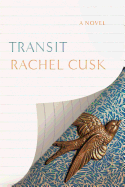
Rachel Cusk's Transit is the second in a trilogy, following her 2015 novel, Outline. It's a cool, deliberate book that relies on extended conversations and its narrator's sharp eye to explore themes like fact and fiction, fate and free will. Transit moves its divorced English protagonist Faye from the sweltering Athens of Outline to autumnal London, where she's recently purchased a decaying flat she can barely afford in an upscale neighborhood. Plunging herself deeper into debt, she embarks on a costly renovation project whose disruption draws her into a bizarre conflict with the aged couple living below.
Though the novel is mostly devoid of dramatic incident, save for a brief, explosive episode at a hair stylist's shop, Cusk places Faye in intriguing settings that allow verbally dexterous characters ample freedom to unburden themselves. One of the more striking occasions is a panel where a pair of authors who've moved like conjoined twins on the literary circuit expound on sharply contrasting accounts of their troubled childhoods. One of them, Julian, describes how writing his book had been "both a torment and a relief, like pulling a knife out of his own chest," while the Knausgaardian product of his counterpart, Louis, was "just the low-lying truth of his ordinary existence," a faint echo of Cusk's style.
In both Outline and Transit, Rachel Cusk has gambled that there's an audience for a novel that emphasizes ideas over action and rests its claim to our attention on the consistent keenness of its insights into our human relationships. There's certainly enough of those qualities here to entice readers into discovering what awaits in the final volume of the trilogy. --Harvey Freedenberg, attorney and freelance reviewer

